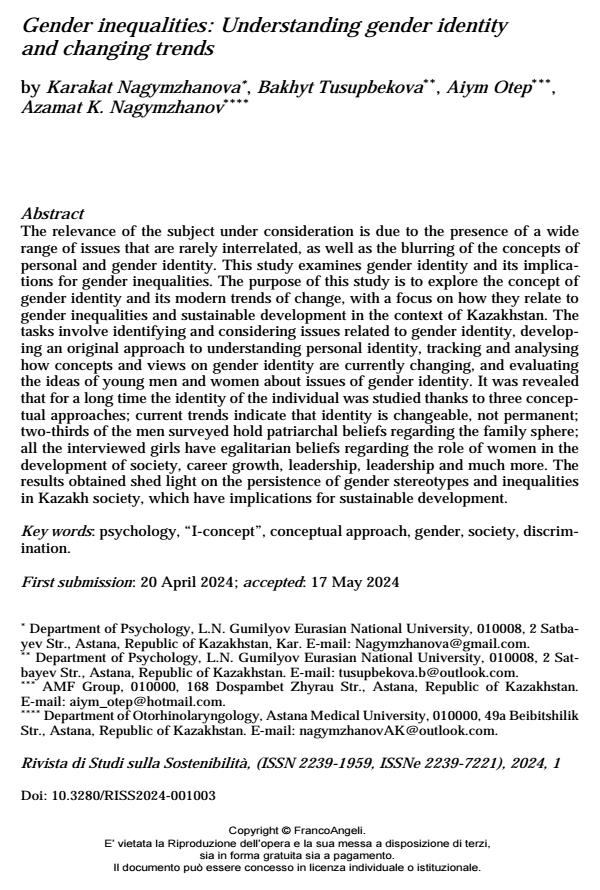Gender inequalities: Understanding gender identity and changing trends
Journal title RIVISTA DI STUDI SULLA SOSTENIBILITA'
Author/s Karakat Nagymzhanova, Bakhyt Tusupbekova, Aiym Otep, Azamat K. Nagymzhanov
Publishing Year 2024 Issue 2024/1
Language Italian Pages 18 P. 27-44 File size 95 KB
DOI 10.3280/RISS2024-001003
DOI is like a bar code for intellectual property: to have more infomation
click here
Below, you can see the article first page
If you want to buy this article in PDF format, you can do it, following the instructions to buy download credits

FrancoAngeli is member of Publishers International Linking Association, Inc (PILA), a not-for-profit association which run the CrossRef service enabling links to and from online scholarly content.
The relevance of the subject under consideration is due to the presence of a wide range of issues that are rarely interrelated, as well as the blurring of the concepts of personal and gender identity. This study examines gender identity and its implica-tions for gender inequalities. The purpose of this study is to explore the concept of gender identity and its modern trends of change, with a focus on how they relate to gender inequalities and sustainable development in the context of Kazakhstan. The tasks involve identifying and considering issues related to gender identity, de-veloping an original approach to understanding personal identity, tracking and an-alysing how concepts and views on gender identity are currently changing, and evaluating the ideas of young men and women about issues of gender identity. It was revealed that for a long time the identity of the individual was studied thanks to three conceptual approaches; current trends indicate that identity is changeable, not permanent; two-thirds of the men surveyed hold patriarchal beliefs regarding the family sphere; all the interviewed girls have egalitarian beliefs regarding the role of women in the development of society, career growth, leadership, leadership and much more. The results obtained shed light on the persistence of gender stere-otypes and inequalities in Kazakh society, which have implications for sustainable development.
Keywords: psychology, “I-concept”, conceptual approach, gender, society, discrimination.
- СРАВНИТЕЛЬНЫЙ АНАЛИЗ УДОВЛЕТВОРЕННОСТИ ЖИЗНЬЮ И ГЕНДЕРНОЙ ИДЕНТИЧНОСТИ У МОЛОДЕЖИ Г.Б. Капбасова, К.М. Нагымжанова, Р.О. Жолшыбекова, in BULLETIN Series Psychology /2025
DOI: 10.51889/2959-5967.2025.84.3.019
Karakat Nagymzhanova, Bakhyt Tusupbekova, Aiym Otep, Azamat K. Nagymzhanov, Gender inequalities: Understanding gender identity and changing trends in "RIVISTA DI STUDI SULLA SOSTENIBILITA'" 1/2024, pp 27-44, DOI: 10.3280/RISS2024-001003